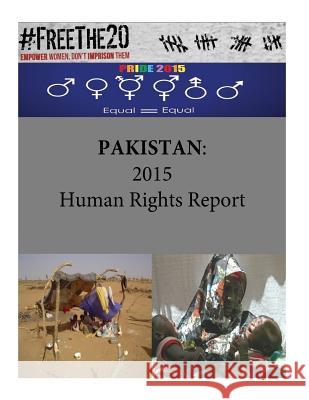Pakistan: 2015 Human Rights Report » książka
Pakistan: 2015 Human Rights Report
ISBN-13: 9781536864212 / Angielski / Miękka / 2016 / 62 str.
The most serious human rights problems were extrajudicial and targeted killings; disappearances; torture; lack of rule of law (including lack of due process, poor implementation and enforcement of laws, and frequent mob violence and vigilante justice); gender inequality; and sectarian violence. Other human rights problems included poor prison conditions, arbitrary detention, lengthy pretrial detention, a weak criminal justice system, lack of judicial independence in the lower courts, and governmental infringement on citizens' privacy rights. Harassment of journalists continued, with high-profile attacks against journalists and media organizations. There were government restrictions on freedom of assembly and limits on freedom of movement. Government practices and certain laws limited freedom of religion, particularly for religious minorities. Continuing terrorist violence and human rights abuses by nonstate actors contributed significantly to human rights challenges in the country. In June 2014 the government and military began Operation Zarb-e-Azb, a military campaign against militant and terrorist groups in North Waziristan; the operation later expanded to include areas throughout the country. Following a December 2014 Tehrik-i-Taliban attack on the Army Public School of Peshawar that killed 145 individuals, including 132 schoolchildren, the government announced a National Action Plan (NAP) against terrorism. Under the NAP the government passed a constitutional amendment, which established military courts to try civilians suspected of engaging in terrorism and related activities; the Supreme Court upheld the amendment in August. The government reinstated the death penalty after a seven-year hiatus. Discrimination against religious minorities continued. Corruption within the government and police, as well as rape, domestic violence, sexual harassment, honor crimes, other harmful traditional practices, and discrimination against women and girls remained serious problems. Child abuse and commercial sexual exploitation of children persisted. Child labor remained pervasive. Widespread human trafficking, including forced and bonded labor, continued. Societal discrimination against national, ethnic, and racial minorities persisted, as did discrimination based on caste, sexual orientation, gender identity, and HIV status. Respect for worker rights was minimal. On August 5, the Constitutional Court upheld a 2011 constitutional amendment that devolved many government responsibilities to the provinces, including for most human rights and labor functions. As a result human rights and labor legislation, enforcement, and practice varied from province to province. Lack of government accountability remained a problem, and abuses often went unpunished, fostering a culture of impunity. Authorities seldom punished government officials for human rights violations. Violence, abuse, and social and religious intolerance by militant organizations and other nongovernmental actors contributed to a culture of lawlessness in some parts of the country, particularly in the provinces of Balochistan, Sindh, Khyber Pakhtunkhwa (KP, formerly known as the North West Frontier Province), and the Federally Administered Tribal Areas (FATA). Between 2003 and November, according to the South Asia Terrorism Portal (SATP), militants killed 6,336 security force personnel and 20,790 civilians, while authorities killed 32,261 terrorists/insurgents.
Zawartość książki może nie spełniać oczekiwań – reklamacje nie obejmują treści, która mogła nie być redakcyjnie ani merytorycznie opracowana.











